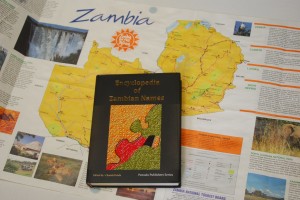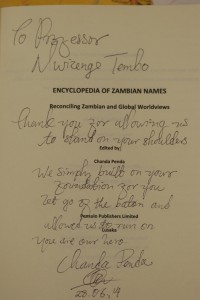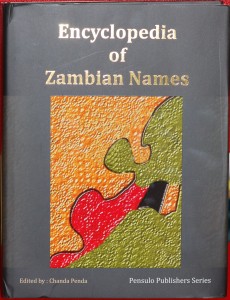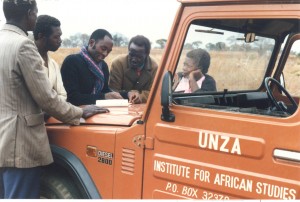By
Mwizenge S. Tembo, Ph. D
Professor of Sociology
Chanda Penda (Ed.), Encyclopedia of Zambian Names: Reconciling Zambian and Global Worldviews, Lusaka: Pensulo Publishers Limited, 2013, pp. 466, $48.93, 300ZMW, Hardcover. pensulopublishers@zambia.co.zm.
Introduction
The taxing massive Zambia Airways DC 10 plane was holding to take off in the pitch dark night with its flashing red lights on the huge protruding long wings. The beautiful stewardesses raced through the isle of the plane holding a canister quickly spraying a mist of an anti-mosquito chemical. Soon the Lusaka International Airport terminal lights zoomed by faster until the massive plane took off into the darkness immediately veering sharp left away from the Great East Road heading towards London, UK. This was December 15, 1989.
I had a heavy heart, deep sadness, and disappointment as if I was attending one of the numerous funerals at Leopards hill Cemetery of many friends who had died of HIV/AIDS in Lusaka that year. My wife and our 3 children were with me; 6 months, 4, and 7. All my previous flights abroad had been as a student or attending conferences with the psychological comfort from the knowledge that I would be coming back home to Zambia. But this was different. We had decided to move to America and for the first time I was going to have a Ph. D. and be unemployed. I wasn’t even sure I was going to be able to afford for many years to return to Zambia to see family, childhood friends, and relatives.
Settling in America
As I begun to settle abroad, one of my major regrets about leaving Zambia was that I was not going to complete the research I had started into the culture and meanings of Zambian traditional names. I deeply cared about the topic as it created a deeper understanding of our Zambian and African culture. This was not a popular research topic to attract national researchers, international academic institutions, NGOs interest and financial sponsors. I had done fieldwork and researched into traditional names from the Eastern and Southern Provinces of Zambia. I was planning next to go to Western Province and then the rest of all the 9 provinces when sadly I had to leave the country.
Encyclopedia of Zambian Names
I was sitting in my office having just received a DHL package on Wednesday afternoon of July 2, 2014. It was a thick book: “Encyclopedia of Zambian Names” edited by Chanda Penda and Pensulo Publisher Series. I felt like I was in a dream. I nervously thumbed through the first pages. The title page was the signed autograph with the handwritten message to me: “To Professor Mwizenge Tembo. Thank you for allowing us to stand on your shoulders. We simply built on your foundation for you let go of the baton and allowed us to run on. You are our hero. Signed Chanda Penda 28.06.14.” This was both a big surprise and a great honor. I became teary eyed as I stared through my office window through the glaze of tears. Over many years, Mr. Penda and a group of dedicated Zambians had completed the research I had to abandon twenty five years ago. My dream had come true.
The next page had the inscriptions: “In Memory of Professor Mukumbuta Lisimba Whose untimely death made him leave behind The Unfinished colossal task of supervising this work.” The Encyclopedia was the efforts and contributions of so many Zambians. The acknowledgements included Professor Lisimba who had contributed Lozi names through “Lozi Names in Language and Culture”. Ms. Mulenga Kapwepwe had contributed through: “Some Bemba Names and their Meanings”. Many of the 500 names from the Eastern Province and 300 from the Tonga in Southern Province were included from my book from the research I had done: “Zambian Traditional Names: The Meaning of Tumbuka, Chewa, Nsenga, Ngoni and Tonga Names”. There were so many contributors and researchers of names from all the provinces from most of the 72 tribes of Zambia including names from the Tonga, Bemba, Lozi, Chewa, Ngoni, Tumbuka, Lunda, Luvale, Kaonde, Mbunda, Namwanga, Lungu, Mambwe, Lamba, Lala, Swaka, Ila, Lenje and Soli.
Zambian Names
A few random examples from virtually hundreds and if not more than a thousand names in the Encyclopedia are: Akapelwa – one for whom it (the sun) won’t rise, Lozi; (p.12) Chakumanda – belongs to the grave, Chewa, Ngoni;(p.12) Chisola – having many miscarriages, eventually giving birth, Luvale;(p.12) Katwishi – uncertainty, Bemba; (p.12). Kapijimpanga – hunter, Kaonde. (p.154). Mutinta – to change in gender, baby born after the woman had 2 consecutive girls or boys, Tonga (p. 229); Mutanuka – to search diligently for something important, Soli; (p.245). Kunotha – to be proud, baby whose parents are proud, hold their heads up, stand tall, Tumbuka (p. 304).
This “Encyclopedia of Zambian Names” has so many interesting and culturally useful details that it is impossible to adequately summarize them in a short review. This is also by definition what an Encyclopedia should be as a reference: contain exhaustive, lasting, and detailed information. There are three broad possible uses of this encyclopedia.
Spreading Knowledge
The first is that it can be used for teaching the deeper authentic cultural foundation, Bantu philosophy and languages of Zambian and African culture in Universities, colleges, schools through newspapers, libraries, radio stations, and TV. Encourage Professors, lecturers, teachers, students of all ages, all libraries, maternity wards in all hospitals and clinics, in, outside Zambia and ordinary citizens to buy the book. The encyclopedia perhaps for the first time in Zambian history represents a solid cultural written validation of who we are and have been as an African people perhaps going back two hundred thousand years. Our names are not just a superficial contemporary representation of clans or totems for anthropological identification and edification. Names constitute the very essence of who we are as a people in both in ancient history and contemporary time. Naming is not just a mindless, arbitrary and impulsive act as a reaction to Westernization but the whole process represents our deeper complex personal identity, cultural history, philosophy, and an expression of the meaning and poetry of life.
All Zambians to Buy the Book
The second broad possible use is that every one of 13 million Zambians in the country and abroad ought to buy and have this encyclopedia on their shelf in the family household. Those who have an affinity to Zambian culture should also buy the book. I will buy a copy for my son who is expecting a child with his wife. They have no direct connection to Zambian culture if they wish to choose a Zambian name for their child and my grandchild. My grandchildren and great grandchildren will be able to use the book. Anyone in the world who wants to choose a good meaningful Zambian name for their child will have this Encyclopedia as a prefect source of names. One last profound statement is from Naboth Ngulube in Some Aspects of Growing Up in Zambia: “Culture needs a strong foundation in the formative years of the people concerned. You do not speechify culture.” (1989: p. 176). What he means is that for our Zambian and Africa culture should be preserved it must be lived and not merely talked about. Your act of buying and using this Encyclopedia today will actively promote, conserve, and validate our Zambian heritage and African culture.

Dominique Muchimba, center, research assistant and translator, records information about the meaning of Tonga names in Gwembe Valley in the Southern Province in August 1988.
Zambians and African Origins of Humans
The third use of this encyclopedia is that the names should eventually be used to properly investigate, reclaim, validate, authenticate, and properly establish that we Zambians, Africans and Bantu people are the origins of the 7 billion people to day. The “ANNEX” of the Encyclopedia from pages 449 to 451 which has the title: “How International is Your Name” as is written suggests that Zambian names may have randomly and arbitrarily spread recently to other parts of the world from recent times up to 2014. This may not be the whole story. It is more likely that Zambians, Africans, or Bantu people migrated from East Africa with their names and their Bantu languages and names of places from two hundred thousand, ten thousand, to three thousand years ago. They had settled in Southern Europe, North Africa, the Middle East, Central Europe, India, the Far East region around Banda Sea, Japan and North America. The names of the Bantu people, their language, and Bantu origin place names may still exist today in these places. All of this will be confirmed through further linguistic historical research soon. This Encyclopedia may just be the beginning.
References
Anta Diop, Cheikh., The African Origin of Civilization: Myth or Reality, Edited and Translated by Mercer Cook, Chicago, Illinois: Lawrence Hill Books, 1974.
James, George G. M., Stolen Legacy: How the Wisdom of Ancient Egypt was Transformed into Greek Philosophy, San Diego, California: The Book Tree, 1954.
Ngulube, Naboth., Some Aspects of Growing Up in Zambia, Lusaka: Nalinga Consultancy/Sol-Consult A/S Limited, 1989.
Sharman, Fergus., Linguistic Ties between Ancient Egyptian and Bantu: Uncovering Symbiotic Affinities and Relationships in Vocabulary, Boca Raton, Florida: Universal-Publishers, 2014.
Sertima, Van Ivan., They Came Before Columbus: The African Presence Before in Ancient America, New York: Random House, 1976.
Tembo, Mwizenge S., Zambian Traditional Names: The Meaning of Tumbuka Chewa Nsenga Ngoni and Tonga Names, Lusaka: Julubbi Enterprise Limited, 2006.
Tembo, Mwizenge S., “The Challenges of life as a citizen and descendant of Zambia and the global world”, Chapter 17, in Satisfying Zambian Hunger for Culture, Xlibris Corporation, 2012; pp. 354-370.
https://hungerforculture.com/?p=618
http://ukzambians.co.uk/home/2013/06/23/tracing-zambian-history-using-our-names-and-languages/
